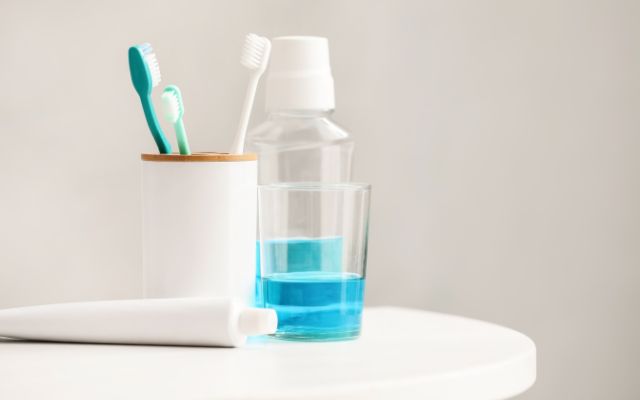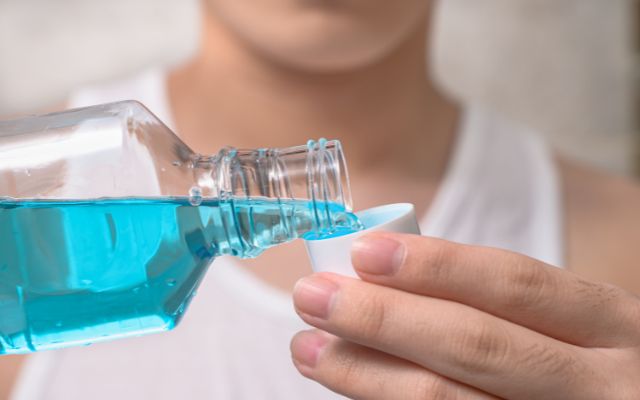Should You Rinse After Brushing Teeth? Mouthwash after brushing is discouraged by the Australian Dental Association. Toothpaste protects against fluoride, whereas mouthwash removes it. Mouthwash includes healthy and dangerous microorganisms. Mouthwash complements toothpaste since it has mild antimicrobial capabilities.
Dentist Spring Orchid answers all mouthwash questions in this post.
Should You Rinse After Brushing Teeth?

No, you shouldn’t. The Australian Dental Association advises against using mouthwash right after brushing because mouthwash will eliminate the protective fluoride coating that toothpaste will cover.
“Rinse your mouth after brushing will make you more prone to tooth decay,” said London dentist Anna Peterson to Fox News (UK). Ms. Peterson’s TikTok video discourages mouthwash used after brushing. This video is popular with over 1.8 million views.
Dentist Peterson advises against this since it destroys teeth. Having brushed, fluoride-rich toothpaste will coat teeth in a protective layer. Mouthwash eliminates fluoride.
Mouthwash: Pros And Cons?
Today, most people have adopted the practice of gargling with salt water or another solution after cleaning their teeth. However, understanding the benefits and drawbacks of using mouthwash and the proper technique for rinsing your mouth is crucial for maintaining good oral health:
Advantages | Disadvantages |
|
|
Medical-grade Mouthwash Instructions
Oral hygiene includes mouthwash, which cleans and kills germs in the mouth for white, healthy teeth. We must comprehend mouthwash and its usage to encourage its use.
Spring Orchid can show you how to use mouthwash correctly:
- First, brush your teeth.
- Remove the remaining food with a tooth floss.
- Fill the cup with 20-25ml mouthwash. Using the specified ratio, diluted mouthwash.
- Swish mouthwash into the oral cavity for the required duration, generally 30-45 seconds for regular dental health and 1-2 minutes for periodontal disease.
- Gargle and spit. Never swallow!

Can Mouthwash Replace Brushing?
No, every dentist advises brushing before eating and using mouthwash just as a supplement.
In fact, many individuals choose to use mouthwash instead of cleaning their teeth since it is easier to use and requires less effort. Misguided! Without brushing, mouthwash might affect your teeth and health. Since mouthwash contains relatively weak antibacterial properties, it complements toothpaste rather than a replacement.
Thus, under comfortable situations, clean your teeth and use more mouthwash, while under challenging settings, use mouthwash as a temporary replacement. Brush your teeth as soon as possible.
How Often Is It Safe to Use Mouthwash Daily?

Health experts advocate using mouthwash no more than 2-3 times a day. That’s a good mouthwash, but we shouldn’t use too much of it. For the simple reason that there are both bad and good bacteria present in the mouth. Too much mouthwash is bad. It’s recommended to follow the product’s instructions while using mouthwash.
People often feel at ease using mouthwash, and will often gargle with it if they feel any discomfort or believe their mouth is unclean. In contrast, the high concentration of alcohol in most mouth rinses may quickly dehydrate the oral mucosa and produce discomfort in the gums, and cheeks, worsening teeth decay and halitosis.
Tips On Selecting A Mouthwash
Although there are numerous types of mouthwash with appealing tastes and colors, this is not the initial selection criteria. To pick a mouthwash for your dental health, examine the components:
- Alcohol-free mouthwashes are best for dry mouth. In addition to drying out your mouth, using an alcohol-based mouthwash may reduce saliva production.
- Tooth decay mouthwash selection: Use fluoride mouthwash. However, because ingesting too much fluoride might be dangerous, you should avoid doing so while using mouthwash.
- Choose a chlorhexidine mouthwash for gum disease. Still, it’s smart to check with your medical professional before picking out a mouthwash, just to be cautious.
Mouthwash Using Tips

Although mouthwash is excellent, you should pay attention to the following issues:
- The proper product for your teeth and gums will be selected by you based on how your teeth and gums are doing right now. You should use caution while using mouthwash since almost all of them include alcohol.
- Alcohol-containing items should not be used by children to prevent swallowing.
- Alcoholic mouthwash may create alcohol addiction and cravings, thus those who stop drinking should avoid it.
- After gargling with mouthwash, hold off on any food or liquid intake for at least 30 minutes.
- Buy mouthwash from trusted stores and use it properly. Mouthwash should be used 2-3 times a day to prevent and treat oral illnesses.
- You can use mouthwash before or after flossing. Keep in mind that using mouthwash is not a replacement for brushing your teeth and flossing, but rather an addition to a regular daily oral hygiene practice.
Summary
One essential oral hygiene step to promote excellent health is using mouthwash. When mouthwash is used improperly, the reverse happens, aggravating tooth issues. So, please abide by the usage and dosage guidelines. Dental issues, nevertheless, are impossible to totally prevent. Do not hesitate to get a 6 dental checkup.
Choose our Bassendean Dental Clinic as the location for your family’s dental health. The top quality dental certification in Australia, QIP, is met by Spring Orchid’s general dental services.
FAQs
Is Mouthwash Necessary?
Absolutely. It’s not a replacement for toothbrushes and floss, but using them together may help prevent tooth decay and gum disease.
This approach also helps you brush and floss every day, reducing tooth health issues. A 2-minute mouthwash rinse won’t whiten your teeth. If you brush, floss, and rinse daily, you’ll eventually have a brilliant white grin.
Can Mouthwash Stop Gum Bleeding?
No. Mouthwashes cannot treat significant dental issues. If your gums bleed easily or your breath smells terrible on a regular basis, for instance, you should seek the services of a qualified dentist. The Spring Orchid Dental Clinic is an excellent option for patients in the Bassendean area of Western Australia.
Need To Rinse With Water After Using Mouthwash?
No mouth with water rinsing is required. Water consumption is not recommended for at least 10 minutes after spitting up the solution. Because certain chemicals might trigger allergies, fluoride-containing water should only be used once a day and swallowed sparingly.
When to use mouthwash?
To make the most of your mouthwash, it’s essential to know when to use it. Here are some situations when incorporating mouthwash into your routine can be beneficial:
- As part of your daily oral care routine: Using mouthwash after brushing and flossing can provide an extra layer of protection against bacteria and plaque buildup. It leaves your mouth feeling refreshed and your breath minty fresh.
- Before bedtime: Using mouthwash before going to bed can help kill bacteria that have accumulated throughout the day. It provides a clean feeling and fresh breath for a good night’s sleep.
- After consuming strong-smelling foods or beverages: Mouthwash can help eliminate lingering odors caused by pungent foods or drinks, such as garlic, onions, coffee, or alcohol. It provides a quick and effective solution to combat temporary bad breath.
- When you’re unable to brush your teeth: In situations where brushing is not possible, such as during travel or after meals, using mouthwash can help maintain oral hygiene temporarily. It can remove food particles, freshen breath, and inhibit bacterial growth until you can brush properly.
Should I salt rinse before or after brushing?
It’s generally recommended to do a salt rinse after brushing your teeth.





